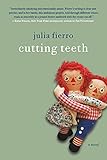 In writing my first novel, Cutting Teeth, when I got to the first scene that demanded dramatized sex — action, sound, smell, taste, the works — I paused. The word that made me lift my fingers from the keyboard was “clitoris.” Was it okay to use this word? What would my fellow literary writers, my former teachers and classmates at the Iowa Writers’ Workshop think of me? I laughed at my insecurity, although part of me loathed my hesitation. Of course it was okay. It’s just a body part, I told myself. I had the same reaction in the other sex scenes I wrote — most involved a man and a woman, one two women. Nipples. Cock. Dick. Balls. Even typing these words now gives me a shiver of fear, as if the literary gods will strike me dead, or brandish me with a scarlet S for writing not only bad sex, but any sex at all.
In writing my first novel, Cutting Teeth, when I got to the first scene that demanded dramatized sex — action, sound, smell, taste, the works — I paused. The word that made me lift my fingers from the keyboard was “clitoris.” Was it okay to use this word? What would my fellow literary writers, my former teachers and classmates at the Iowa Writers’ Workshop think of me? I laughed at my insecurity, although part of me loathed my hesitation. Of course it was okay. It’s just a body part, I told myself. I had the same reaction in the other sex scenes I wrote — most involved a man and a woman, one two women. Nipples. Cock. Dick. Balls. Even typing these words now gives me a shiver of fear, as if the literary gods will strike me dead, or brandish me with a scarlet S for writing not only bad sex, but any sex at all.
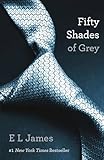 Today, sex is everywhere — on TV, our computers, even our phones. But in the last two years, since Fifty Shades of Grey became the fastest-selling paperback of all time, the jaws of literary writers have dropped, their shock over the book’s success, despite its unliterary style, echoing over the Twitter-waves. Part of me wants to say I was one of them — if only to be included in their elite ranks — but I wasn’t that surprised. I haven’t forgotten the lusty attraction of my grandmother’s paperback romances, which, as a pre-teen, I had secreted away to read at night by flashlight.
Today, sex is everywhere — on TV, our computers, even our phones. But in the last two years, since Fifty Shades of Grey became the fastest-selling paperback of all time, the jaws of literary writers have dropped, their shock over the book’s success, despite its unliterary style, echoing over the Twitter-waves. Part of me wants to say I was one of them — if only to be included in their elite ranks — but I wasn’t that surprised. I haven’t forgotten the lusty attraction of my grandmother’s paperback romances, which, as a pre-teen, I had secreted away to read at night by flashlight.
Long before I thought of myself as a writer, I was a reader. I grew up in a house of few books — my father’s set of encyclopedias in his native Italian and a handful of history books left over from my mother’s college education. My mother has a Masters in Education, but she hasn’t read a book in decades. My father was hungry for knowledge, but struggled to read our middle school science and social studies textbooks, the basic English too much of a challenge.
As a child, books were a magical distraction from my anxiety — what, 20 years later would be diagnosed as obsessive-compulsive disorder. At school, every real-life, real-time decision — who to befriend, who to avoid — carried an infinite possibility of catastrophe, but I was safe when living inside a book. The day came when it seemed as if I’d read every book in our small school library, and the librarian was at a loss for suggestions that were age-appropriate. This was the mid-1980s, years before the YA market exploded. I needed the imagined life books gave me — without them it seemed as if real life lost its luster.
I stole one of my grandmother’s Danielle Steel novels. I don’t remember the title, only the pearlescent cover’s gold-embossed cursive that promised diamonds, high heels, and Farah Fawcett-hair — a glimpse into a dramatic adult world. What I do remember are the sex scenes. I replaced the book the next week and stole off with another, and so on, until I had read all in my grandmother’s collection. Those books taught me so much — that you could have sex standing up or even underwater in a pool! Along with the sex came emotion. These men and women were brazenly sentimental, confessing passion, hatred, and envy, and that melodrama kept me glued to the page.
Once I entered college, I left my towers of commercial fiction paperbacks behind in my parents’ basement. I declared a major in English and became a convert of the literary readership. I read what my professors assigned, mostly novels by white men written over a century ago, where sex and emotion were abstractly implied in only the most metaphysical sense. When it was my turn to choose my literary electives, I picked Hawthorne, Melville, and Dostoyevsky over the “scribbling women writers” of the 19th century, who, one of my professors explained with more than a hint of disdain, were the equivalent of our modern-day Danielle Steele and Jackie Collins. I remember blushing. Could he tell that I had once feasted on those emotionally hyperbolic and overtly sexual scenes?
By the time I was accepted at the Iowa Writers’ Workshop, the furthest I’d ventured into American literature was the modernism of Sherwood Anderson, Hemingway, and Fitzgerald. For the first time, I read short fiction writers known for their “spare” prose style, like Raymond Carver, whose work my classmates praised as “quiet” and “restrained.” Now, emotion (and the rare sex scene) was conveyed delicately through mood and atmosphere. I felt a kind of reader’s depression. Where was the meaning? How far did I have to dig under the surface of the prose? It felt as if there was a hole in my reader’s heart. Not that I would have ever mentioned the “heart” in workshop, the most sentimental of symbols.
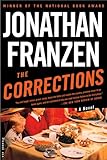 After a semester of workshops where we praised writers who wrote in “trim” prose, I was converted to an more refined literary camp, where subtlety trumped all, even emotion. The more subdued my own writing style became the more my classmates appreciated it in workshop. This was especially true of the male writers, who began to imply, through playful teasing, that I wrote “stories about women for women,” and that I was lucky, because, “maybe someday Oprah will pick you for her book club.” This was the same year Jonathan Franzen was touring the country and publicly mocking the Oprah Book Club sticker on book jacket of The Corrections.
After a semester of workshops where we praised writers who wrote in “trim” prose, I was converted to an more refined literary camp, where subtlety trumped all, even emotion. The more subdued my own writing style became the more my classmates appreciated it in workshop. This was especially true of the male writers, who began to imply, through playful teasing, that I wrote “stories about women for women,” and that I was lucky, because, “maybe someday Oprah will pick you for her book club.” This was the same year Jonathan Franzen was touring the country and publicly mocking the Oprah Book Club sticker on book jacket of The Corrections.
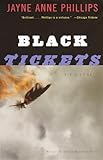 I feared my male classmates were right. Was I destined to become a commercial writer who was, gasp, popular? With a misdirected motivation that thrives with youth, fueled by my fear of rejection, I committed myself to toning down the emotion in my writing. My model was Jayne Anne Phillips’s story collection, Black Tickets, published in 1979 soon after Phillips’s own turn as a young woman writer at Iowa. I was determined to make my stories just as tight, lean, and fucked-up. I wrote a few sex scenes — spare in style and violent in content — and the “risks” I took in writing about sex were applauded in class.
I feared my male classmates were right. Was I destined to become a commercial writer who was, gasp, popular? With a misdirected motivation that thrives with youth, fueled by my fear of rejection, I committed myself to toning down the emotion in my writing. My model was Jayne Anne Phillips’s story collection, Black Tickets, published in 1979 soon after Phillips’s own turn as a young woman writer at Iowa. I was determined to make my stories just as tight, lean, and fucked-up. I wrote a few sex scenes — spare in style and violent in content — and the “risks” I took in writing about sex were applauded in class.
Looking back now, re-reading those scenes, I see they are just shadows of real characters feeling vague emotion. Instead a gulf separates the reader from the character’s experience. I confess that I felt very little when I wrote those scenes; I was merely copying the writers I thought I was supposed to admire. I was removed from the characters even when writing semi-autobiographically. They were damaged young girls I used to impress my teachers and classmates. I remember typing the final line of a story — one that would earn me a coveted fellowship — And she will point to her hand, freed from the bandage, and say, Oh this? It’s nothing.
I asked myself, shouldn’t she, the girl in my story, be feeling more? Shouldn’t I be feeling more?
I did, once during my time at Iowa, write a story that risked unrestrained sex and emotion — about a schoolgirl in love with a young priest. The priest reciprocated with flirtation. I was 22 years old. I knew little of the complexities of sex and relationships. I was merely practicing them on the page. The story was told very close to the young girl’s consciousness so that her thoughts and feelings acted as a kind of voice, and when she reacted in scene, the emotion was anything but subtle.
As my aging Irish-Catholic workshop instructor spent the majority of that class deploring the way I had “corrupted the language,” I couldn’t tell if he was more offended by my technique or the blasphemy of a girl in an erotic relationship with a man of the cloth. When my instructor asked the class if my story would have a snowball in hell’s chance of being published in The New Yorker (his gold standard), I knew it was the melodrama that offended him most. I abandoned that story, and it was years before I wrote another scene that was concretely sexual or emotional.
Was I alone in this fear of writing about sex and the emotion of intimacy? I asked my friends and students. Unsurprisingly, those who write fiction marketed as genre, whether historical, women’s fiction, romance, or thrillers, feel more comfortable writing sex. Those published in erotica anthologies revel in their confidently drawn sex scenes. Most of these writers are women and write for a mostly female audience.
When I asked literary writers about their experience writing sex, their responses ranged from, “I am terrified of sex scenes!” to “I fear the reader will think I’m a pervert, or terrifically immature, or both.” Why do so many literary writers fear writing about sex? Why do we add to the collective anxiety by celebrating The Literary Review’s “Bad Sex Award” — the annual public humiliation and literary stoning of one published writer?
In my experience as both a writer and a teacher, this fear of writing about sex is tied to the fear of sentimentality that takes root in a writer’s formative years. Writing instructors chastise writers in class — a setting that can feel quite public — when the writer risks sentiment, which a naïve writer might mistake for emotion. Writers accrue a kind of scar tissue, blocking their ability and their confidence to imply emotion, inevitably leading to a clouding of meaning in their work.
Most of the writers who felt comfortable writing about sex did not attend MFA programs, where “show don’t tell” is a mantra, another way of saying “do not venture into sentimentality.” This is an essential lesson for beginning writers, but I wonder if writing instructors, myself included, preach against sentimentality so often that it creates anxiety in our students. The writer must be the first reader to feel the emotional intention of the story. The heart of the story (there’s that heart again) won’t exist if the writer never takes that leap of faith.
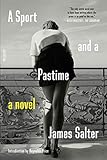 Ask a roomful of literary critics about sex in fiction and they will champion James Salter — a captain of the “spare” style team. The New York Times called Salter’s novel, A Sport and a Pastime, “a tour de force in erotic realism.” The novel is set in 1950s France and the unnamed narrator is an exceptionally passive observer of an affair between Phillip, a bourgeois American, and Anne-Marie, a young French woman:
Ask a roomful of literary critics about sex in fiction and they will champion James Salter — a captain of the “spare” style team. The New York Times called Salter’s novel, A Sport and a Pastime, “a tour de force in erotic realism.” The novel is set in 1950s France and the unnamed narrator is an exceptionally passive observer of an affair between Phillip, a bourgeois American, and Anne-Marie, a young French woman:
Her flesh appears, still smelling a little of soap. His hands float onto her. The sum of small acts begin to unite them, the pure calculus of love. He feels himself enter. Her last breath — it is almost a sigh — leaves her. Her white throat appears.
I imagine Salter intentionally stripping every hint of emotion from the prose, perhaps to avoid the pitfalls of sentimentality. London’s The Times praised the novel, “Just to read it makes you feel alive.” I felt the very opposite. I felt hollow. There was little that felt alive or realistically erotic about watching Philip and Anne-Marie as if from across a vast ocean. Is writing about sex with such distance less of a risk, when compared to a writer who places him or herself inside the character’s every kiss, stroke, and thrust, acting as the pioneer in whose footsteps the reader will follow?
Intention is one excuse literary readers, including myself, use to defend flaws in our own work and in that of our predecessors, but there is a big difference between what a writer intends the reader to think and feel, and the reader’s actual experience. Salter’s novel was revolutionary for its eroticism when published in 1967, but why are today’s literary writers looking to a novel so dated in its portrayal of sex? Is it because the ambiguous intimacy allows them to further avoid addressing the challenges of writing sex?
Sarah Waters, award-winning and best-selling novelist, is well known in her native England, but I have often wondered why she isn’t more popular among American literary readers. There are several possible factors: she is a woman who often writes historical fiction, she is a lesbian, and most of her characters are women. But there is nothing unliterary about Waters’s technique.
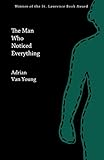 Adrian Van Young, author of the story collection The Man Who Noticed Everything, and one of the few male literary writers or readers I know who has read Waters, has this to say: “Waters seldom writes sex that isn’t intrinsically connected to emotion, and together they form an almost elemental force in her fiction.” It is this intrinsic connection between emotion and sex, whether tender, violent, or awkward, that gives Waters’s sex scenes a sense of being earned, necessary to the story.
Adrian Van Young, author of the story collection The Man Who Noticed Everything, and one of the few male literary writers or readers I know who has read Waters, has this to say: “Waters seldom writes sex that isn’t intrinsically connected to emotion, and together they form an almost elemental force in her fiction.” It is this intrinsic connection between emotion and sex, whether tender, violent, or awkward, that gives Waters’s sex scenes a sense of being earned, necessary to the story.
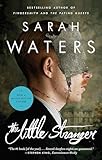 Waters’s most recent novel, The Little Stranger, short-listed for the Man Booker Prize, is set in the 1940s in a dilapidated English mansion. The novel is told from the perspective of country doctor Faraday, who forms an unusual friendship with Caroline Ayres, the spinster daughter of the estate. Like Salter’s A Sport and a Pastime, the storytelling relies on an unreliable narrator, yet in Waters’s The Little Stranger, the reader is a participant in the erotic mystery, not just a voyeur.
Waters’s most recent novel, The Little Stranger, short-listed for the Man Booker Prize, is set in the 1940s in a dilapidated English mansion. The novel is told from the perspective of country doctor Faraday, who forms an unusual friendship with Caroline Ayres, the spinster daughter of the estate. Like Salter’s A Sport and a Pastime, the storytelling relies on an unreliable narrator, yet in Waters’s The Little Stranger, the reader is a participant in the erotic mystery, not just a voyeur.
…my thumb slid just beyond the inner edge of (her coat), and met the start of the swell of her breast. I thought she flinched, or shivered, as the thumb moved lightly over her gown. Again I heard the movement of her tongue inside her mouth, the parting of her lips, an indrawn breath.
The writing is subtle in emotion and tone, but Waters builds an empathic bridge between her reader and both the characters through Dr. Faraday’s imagination, particularly in the way that he wonders what Caroline is feeling. In A Sport and a Pastime, Salter intentionally levels that bridge. Is it a coincidence that so many sex scenes written by women for women seem to focus on the characters’ feelings? I think not.
Ten years have passed since I left Iowa, and in that time I wrote a novel that didn’t sell, took a break from writing, and founded The Sackett Street Writers’ Workshop. It was the 2,000 Sackett writers who gave me the confidence to return to writing, ultimately resulting in a novel that I am proud of, that has its sexy moments, and is to be published by St. Martin’s Press in the spring of 2014.
I tell MFA-bound students that a graduate program is a great place to learn craft and to live and party among writers, but not always the easiest place to write. It took me years of post-MFA retrospection to sort through the assumptions I’d adopted on what makes writing good or bad. My voice has risen from the ashes and it is no restrained peep, but somewhere between a croon and a ballad. There are the withholders like Salter and Carver, and there are the revealers, my own literary camp. I’ve accepted this after years of resistance. Salter is like that aloof James Dean-esque boy, the one the girls go crazy for because he lives in his own world. He is enigmatic. I desired those boys in my youth, but I’m all grown up now and don’t have the patience for those unreadable types.
With great relief, I’ve discovered that I am pretty good at writing sex. My readers are all (but for my husband) literary women writers and they concur. Even my mother-in-law, reacting to a particularly steamy sex scene in my novel, said, “Well, how about that? That sex scene was something!”
As in most things literary, the solution to writing “good” sex, and protecting yourself (fingers crossed) from The Literary Review’s “award,” is to think of the reader. Just as there is an infinite variety of “good sex” — the factors dependent on those partaking — there are also an infinite variety of writers, each with his or her ideal reader. Me, I want my literary sex real — fluids and all.
Image Credit: Flickr/yaaaay









